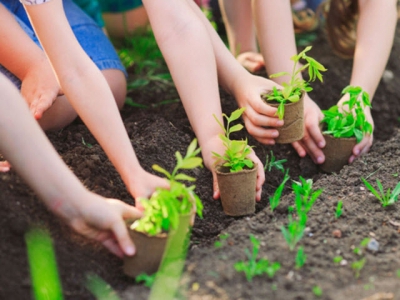Vietnam agriculture accompanies businesses on creating and preserving a green planet

Minister Le Minh Hoan stated his hope that the results of COP26 would result in a greener planet that can sustain the lives of the world's over 7 billion people.
Every action to make the earth greener is appreciated. Photo: HA.
Minister of Agriculture and Rural Development Le Minh Hoan attended a conference in Glasgow, Scotland (the UK), on November 1 hosted by Prime Minister Pham Minh Chinh, titled "Creating a sustainable and prosperous future via private investment".
The event brought hundreds of major local and international firms, who discussed the direction and actions needed to attract corporate investment and promote green and sustainable development in Vietnam. It was conducted in conjunction with the Prime Minister's attendance at the United Nations' 26th Conference of the Parties on Climate Change (COP26).
Minister Le Minh Hoan stated at the conference that regardless of the condition, from the past to the present, or before to and during the Covid-19 epidemic, food remains the nation's and the world's primary commodity. Vietnam is prospering as the leading exporter of tropical agricultural goods, fisheries, timber, and forest products due to its agricultural strength.
Vietnam encourages private sector participation in agriculture production through investment, research, and application of advanced technologies, as well as through the use of digital technologies and creative transformation to improve production, output, and distribution, and to create a more robust recovery capacity for the agriculture supply chain.
Vietnam has attracted over 55,000 firms involved in agricultural and allied industries, accounting for around 8% of total enterprises operating in the nation. Vietnam's agriculture has attracted significant and well-known agricultural firms from throughout the globe, with almost USD 1 billion in FDI projects in agriculture.
However, in the face of several obstacles, such as market fluctuations and climate change... Vietnam agriculture must transform in order to meet market demands.
The Minister added that the MARD is now preparing the Agriculture and Rural Development Strategy to 2030, with a vision to 2050, with the goal of bringing the agricultural sector into the modern era, focused on innovation and supporting green development in agriculture.
On this foundation, Vietnamese agriculture will transform into a transparent, responsible, and sustainable global food provider. The Minister urged investors to concentrate their efforts on growing knowledge agriculture, agroforestry-fishery processing, diversified high-value-added goods, and agricultural value chain logistics.
Minister Le Minh Hoan said that when it comes to the consequences of climate change on agricultural growth, particularly in the Mekong Delta area, Vietnam is the nation suffering the most from climate change and natural disasters. The nation is confronted with losses and damages that exceed its capacity to manage, even with climate change adaptation measures in place and greenhouse gas emissions being reduced.
Climate change has had a significant impact on Vietnam's socio-economic growth in a variety of sectors, with agriculture being the most susceptible.
The average economic loss caused by climate change over the last three decades has been around 1.5 percent of GDP each year, and the harm might reach 3-5 percent of GDP per year in the future. People living in hilly and coastal locations, particularly the poor, women, and children, are disproportionately impacted.
According to Vietnam's climate change scenario, by 2100, the average temperature in the Mekong Delta will rise by 2.5–3.7oC and the average sea level will rise by 0.8–1m, putting approximately 39% of the Mekong Delta at risk of flooding, severely affecting production and business activities, particularly in the agricultural sector.
Vietnam's agriculture must shift its development model toward "multi-value integration" and toward "high technology, ecological, social responsibility, and sustainability." Promote the "greening" of food and food systems by reducing greenhouse gas emissions. To prioritize rural economic growth, safeguard the ecological environment, utilize natural resources prudently, and preserve and conserve biodiversity.
Minister Le Minh Hoan expressed optimism that the results of COP26 would lead in a greener planet that could sustain the lives of over 7 billion people worldwide. The world has a duty to take collective action for sustainable development, with a particular emphasis on disaster-prone areas and nations. The Minister urged investors and international organizations to partner with the Vietnamese government in investing in the synchronized development of agricultural infrastructure, both for production and rural economic development, that is climate-change-ready.
Standard Chartered invests $8.5 billion in Vietnam's green development
"At COP26, world leaders are pressing for climate action. Southeast Asia is an area that faces several hazards from climate change. Vietnam has set high renewable energy objectives, and the money required to assist it in transitioning to a zero-carbon economy is enormous.
We are dedicated to assisting Vietnam's sustainable development initiatives and look forward to collaborating with the Vietnamese government on the transition to a zero-carbon economy," Standard Chartered Bank Chairman Jose Vinals remarked.
Standard Chartered Bank granted memorandums of understanding totaling USD 8.5 billion to three Vietnamese firms to promote sustainable development projects in the presence of Prime Minister Pham Minh Chinh, ministers, and Mr. Jose Vinals, Chairman of Standard Chartered Bank.
Có thể bạn quan tâm
 Bac Lieu produces cost-reduction and climate-resilient rice varieties
Bac Lieu produces cost-reduction and climate-resilient rice varieties Bac Lieu Agricultural Breed Center has many Bac Lieu branded rice varieties that have been planted and tested in different ecological regions.
 Autumn-winter rice prices increase, but profits are low
Autumn-winter rice prices increase, but profits are low Vinh Long province's farmers have harvested more than 20,000 hectares of autumn-winter rice in 2021. While rice prices have increased slightly but farmers
 Ambassadors, businesses advise on export of vegetables and fruits to the EU
Ambassadors, businesses advise on export of vegetables and fruits to the EU A focus on ensuring food safety; further promoting products through large, prestigious fruit and vegetable fairs or finding ways to reduce logistics costs